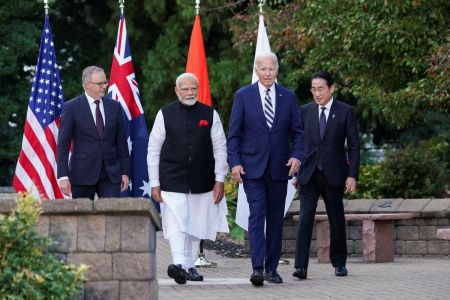During an event on Saturday, US President Joe Biden forgot to introduce Prime Minister Narendra Modi, who was present along with other Quad leaders, Australian PM Anthony Albanese and Japanese PM Fumio Kishida. In a widely circulated video, Biden can be seen thanking those present at the venue, while the four Quad leaders were seated on stage.
On September 21, 2024, Prime Minister Narendra Modi participated in a pivotal Quad meeting in the United States, alongside leaders from the United States, Japan, and Australia. This summit, marked by increasing geopolitical tensions, particularly with China, served as a platform for Modi to articulate India’s stance on regional security and cooperation. The discussions highlighted a unified approach among Quad nations to address common challenges, primarily the assertive actions of China in the Indo-Pacific region.
Read More: China’s Fear of India: Unveiling the Geopolitical Tensions
Context of the Quad Meeting
The Quad, or Quadrilateral Security Dialogue, has evolved into a significant geopolitical entity since its inception in 2007. It aims to promote a free, open, and inclusive Indo-Pacific region, responding to various challenges posed by an increasingly assertive China. As concerns over China’s military expansion, economic coercion, and disregard for international norms have grown, the Quad countries have sought to present a united front.
In 2024, the backdrop of the meeting included ongoing tensions in the South China Sea, border disputes in the Himalayas, and increasing Chinese naval operations in the Indian Ocean. These developments necessitated a strategic dialogue among the Quad members to reinforce their collective commitment to regional stability.
Modi’s Address: Fostering Unity Against Aggression
During his address at the summit, Prime Minister Modi emphasized the necessity of collaboration among Quad nations to counteract the growing influence of China. He articulated a vision of unity, stating that the challenges in the Indo-Pacific are best addressed collectively rather than through unilateral actions.
Key Points from Modi’s Speech
- Promotion of a Rules-Based Order: Modi underscored the importance of upholding international laws and norms, particularly in maritime disputes. He reiterated that the Indo-Pacific should remain free from coercive practices, calling for adherence to the United Nations Convention on the Law of the Sea (UNCLOS).
- Strengthening Economic Ties: Addressing economic resilience, Modi stressed the need for Quad nations to enhance trade partnerships, supply chain reliability, and technological cooperation. He pointed out that economic stability is crucial for regional security, arguing that interdependence can serve as a counterweight to aggressive postures.
- Collective Defense Initiatives: Modi highlighted the importance of joint military exercises and defense collaborations, emphasizing that a coordinated approach would deter any unilateral attempts at territorial expansion. He noted the significance of information sharing and interoperability among the Quad nations.
- Inclusive Regional Development: Acknowledging the need for inclusive growth, Modi proposed initiatives aimed at infrastructure development and climate resilience, which could serve as platforms for collaboration among the Quad countries and their regional partners.
Confronting China’s Assertiveness
In direct reference to China, Modi’s remarks were clear and pointed. He condemned the militarization of the South China Sea, reiterating India’s stance against any attempts to change the status quo through force. He also expressed solidarity with countries in the region facing similar challenges from Chinese assertiveness, urging for a collective response to uphold sovereignty and territorial integrity.
The U.S. Response: Echoing Modi’s Concerns
President Joe Biden’s response to Modi’s address demonstrated a strong alignment with India’s perspective. Biden emphasized that the United States stands firmly with its Quad partners in ensuring a stable and secure Indo-Pacific. His remarks reinforced Modi’s call for a unified approach against challenges posed by China.
Key Points from Biden’s Address
- Commitment to a Free Indo-Pacific: Biden reiterated America’s commitment to maintaining a free and open Indo-Pacific. He stated that the U.S. would continue to support the rights of nations to navigate and operate freely in international waters.
- Enhancing Military Cooperation: Echoing Modi’s emphasis on defense collaboration, Biden announced plans for increased joint military exercises and intelligence sharing among Quad nations. He highlighted recent naval drills that showcased the Quad’s commitment to regional security.
- Focus on Economic Cooperation: Biden highlighted initiatives aimed at bolstering economic ties among Quad countries, particularly in technology and supply chain security. He noted that economic resilience is a key factor in countering coercive practices.
- Partnership in Climate Change: Biden also addressed broader issues such as climate change, indicating that the Quad nations would collaborate on sustainability initiatives, which are vital for regional stability and resilience.
China’s Reaction: Defensiveness and Counterclaims
In the wake of the Quad meeting, China’s response was swift and assertive. Chinese officials expressed strong disapproval of the Quad’s position, framing it as an effort to contain China’s rise.
Key Points from China’s Response
- Accusations of Provocation: The Chinese Foreign Ministry labeled the Quad as a destabilizing force, accusing its members of exacerbating tensions in the region. Officials argued that the Quad’s military maneuvers and rhetoric were provocative and counterproductive.
- Promotion of Dialogue: China called for dialogue and cooperation, urging Quad nations to abandon what it termed a confrontational approach. Chinese officials reiterated their commitment to peaceful development and denounced attempts to portray China as a threat.
- Assertion of Sovereignty: In a direct response to Modi’s remarks on the South China Sea, Chinese representatives reaffirmed Beijing’s sovereignty over disputed territories. They characterized the Quad’s stance as interference in China’s internal affairs.
- Economic Cooperation Narrative: China emphasized its own initiatives for regional economic cooperation, contrasting its Belt and Road Initiative (BRI) with the Quad’s approach. Beijing claimed that its economic projects aim to enhance connectivity and development in the region.
Implications for Regional Stability
The discussions at the Quad meeting and the subsequent responses from both the U.S. and China signal a significant shift in the geopolitical landscape of the Indo-Pacific. The emphasis on a coordinated response to China’s actions reflects a growing consensus among Quad members about the need for vigilance and unity.
Strengthening Regional Alliances
The Quad’s approach could potentially lead to the strengthening of alliances with other countries in the region, particularly those feeling threatened by China’s assertiveness. Nations such as Vietnam, the Philippines, and Indonesia are likely to seek closer ties with the Quad in light of their own territorial disputes with China.
The Role of Smaller Nations
Smaller nations in the Indo-Pacific are increasingly recognizing the value of the Quad as a counterbalance to Chinese influence. By providing a platform for cooperation, the Quad can empower these nations to assert their sovereignty without feeling overwhelmed by larger powers.
Economic Considerations
As economic ties deepen among Quad nations, the potential for collaboration on infrastructure projects and technological innovation increases. This economic cooperation can serve as a buffer against China’s economic coercion, fostering resilience among Quad members.
Conclusion: Navigating a Complex Landscape
The Quad meeting on September 21, 2024, epitomizes the ongoing struggle for influence in the Indo-Pacific region. Modi’s emphasis on cooperation and collective action against China, coupled with Biden’s supportive stance, reflects a commitment to maintaining a rules-based international order.
China’s defensive response underscores its awareness of the shifting dynamics and its intent to assert its influence. The evolving nature of the Quad, characterized by military cooperation, economic collaboration, and a focus on regional development, will play a crucial role in shaping the future of the Indo-Pacific.
As the world watches these developments, the actions of the Quad will undoubtedly impact not only regional stability but also global geopolitical alignments in the years to come.







